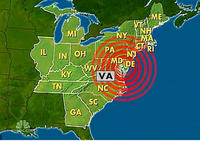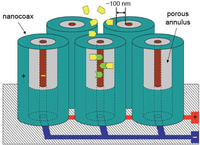-
As Hurricane Isaac beats on New Orleans, new infrastructure is holding up

This week, as Hurricane Isaac was threatening to replicate the physical damage that Katrina inflicted, it has become apparent that $14 billion worth of changes and improvements in infrastructure, planning, and emergency response procedures have given the city of New Orleans and the Gulf states the ability to withstand the worst of the storm
-
-
Isaac leaves flooding, power outages in its path

Hurricane Isaac lost its Category 1 hurricane status midday Wednesday and was downgraded to a tropical storm, but the severe rains and winds which it brought with it have not let up much; the number of power outages continues to increase as the number of homes and businesses without electricity is now up to 834,000 between Louisiana, Mississippi, Alabama, Florida, Texas, and Arkansas, with over one-third of the outages in Louisiana alone
-
-
Industry fights Pentagon efforts to restrict exporting of infrared products
The global market for infrared technology products will be worth about $2.6 billion dollars by 2017; the technology can be used for commercial products such as automotive, surveillance, and security industries – and is heavily used by the military; three major U.S. infrared equipment makers fight the Pentagon’s efforts to restrict exports of devices based on the technology for fear these devices may enhance the military capabilities of adversaries of the United States
-
-
Evaluating fresh water sustainability in the southern U.S.
Researchers have embarked on 4-year federal research effort to evaluate freshwater sustainability across the southern United States and develop policy recommendations on what can be done to make the best use of water supplies in the face of population growth and the effects of climate change over the next ten to thirty years
-
-
New Jersey infrastructure badly needs shoring up, and soon
According to experts, changes to the way New Jersey maintains its infrastructure must be made soon, or the state could be vulnerable to catastrophic failures in its water and power systems as well as collapsing roads; the North Jersey Transportation Planning Authority says more than $56.9 billion will be needed just to maintain state roads, rails, and public transportation systems through 2035; when you add in improvements to account for environmental changes and the expanding population in the state, the bill skyrockets to more than $123 billion
-
-
The costs, benefits, and efficiency of aviation security measures
The threat of terrorist attack on American aviation has made the system the focus of intense security efforts, but it is difficult to determine if the benefits outweigh their cost; efficient security policy — a focus on getting the most security for the least cost — should be the priority in an era of fiscal austerity, says a new RAND report
-
-
China’s growing role in U.S. infrastructure building, maintenance
The building and maintenance of heavy infrastructure in the United States, which includes road, mass transit, marine, and building construction, is worth $44.1 billion per year and $12 billion in annual wages; bridge and tunnel construction is worth an estimated $24 billion in revenue and $4.3 billion in wages; many wonder why, in this difficult times, states and municipalities hire Chinese companies for many of these infrastructure projects
-
-
Heat waves move toward California coasts, become more humid, imperiling health
Scientists detected a trend toward more humid heat waves which are expressed very strongly in elevated nighttime temperatures, a trend consistent with climate change projections; moreover, relative to local warming, the mid-summer heat waves are getting stronger in generally cooler coastal areas; this carries strong public health implications for the twenty-one million Californians living near the ocean whose everyday lives are acclimated to moderate temperatures
-
-
Last year’s east coast earthquake has the region preparing for another one

Last year an earthquake that was centered in Virginia shook up the entire east coast, surprising everyone; it did not result in any deaths and was considered relatively light compared to many tremors on the West Coast, but it was bad enough to force some states to prepare themselves in case of another quake
-
-
Activists in arms over plans to ship plutonium to New Mexico
A proposal to ship tons of plutonium to New Mexico, including cores of nuclear warheads which would be dismantled at a structurally questionable lab on top of an earthquake fault zone, has activists and nuclear watchdogs up in arms
-
-
U.S. always ends up regulating new technologies for public safety; the Internet is no exception
Homeland Security News Wire’s executive editor Derek Major talked with CSIS’s James Lewis about the cybersecurity challenges the United States faces, Stuxnet, China’s hacking campaign, cyber arms control efforts, and more; on the stalled cybersecurity bill, opposed by critical infrastructure operators as being too burdensome, Lewis says: “It takes America about 20-40 years to come to terms with a new technology, but we always end up regulating it for public safety. This will be no different. We are in year 17.”
-
-
Most cybersecurity incidents in Europe remain undetected or not reported
In a new report, the EU cyber security agency takes a snapshot of existing and future EU legislation on security measures and incident reporting; the analysis underlines important steps forward, but also identifies gaps in national implementation, as most incidents are not reported
-
-
Photographers and security personnel fight over access to buildings
In the years after 9/11 and the 7 July 2005 London bombings, photographers have been waging a war with security personnel of public and private buildings; photographers argue that anything that one can see from the street can be photographed, even if it is a privately owned building, but security people – both private and the police – are worried about terrorists gathering information for a possible attack
-
-
Campaign against terrorist financial networks complicated, demanding
The U.S. Attorney for the Southern District of New York and the Drug Enforcement Administration (DEA) last week announced the seizure of $150 million in cash from “entities linked to Hizballah,” including the now-defunct Lebanese Canadian Bank (LCB); the announcement may seem like a big win in the war on terror, but it is merely a small dent as terrorist organizations use a myriad of tactics to move their money around undetected
-
-
DHS using Boston subway system to test new sensors for biological agents

Bioterrorism is nothing new, and although medicines have made the world a safer place against a myriad of old scourges both natural and manmade, it still remains all too easy today to uncork a dangerous cloud of germs; DHS’s Science and Technology Directorate (DHS S&T) has scheduled a series of tests in the Boston subways to measure the real-world performance of new sensors recently developed to detect biological agents
-
More headlines
The long view
Factories First: Winning the Drone War Before It Starts
Wars are won by factories before they are won on the battlefield,Martin C. Feldmann writes, noting that the United States lacks the manufacturing depth for the coming drone age. Rectifying this situation “will take far more than procurement tweaks,” Feldmann writes. “It demands a national-level, wartime-scale industrial mobilization.”
No Nation Is an Island: The Dangers of Modern U.S. Isolationism
The resurgence of isolationist sentiment in American politics is understandable but misguided. While the desire to refocus on domestic renewal is justified, retreating from the world will not bring the security, prosperity, or sovereignty that its proponents promise. On the contrary, it invites instability, diminishes U.S. influence, and erodes the democratic order the U.S. helped forge.
Fragmented by Design: USAID’s Dismantling and the Future of American Foreign Aid
The Trump administration launched an aggressive restructuring of U.S. foreign aid, effectively dismantling the United States Agency for International Development (USAID). The humanitarian and geopolitical fallout of the demise of USAID includes shuttered clinics, destroyed food aid, and China’s growing influence in the global south. This new era of American soft power will determine how, and whether, the U.S. continues to lead in global development.
Water Wars: A Historic Agreement Between Mexico and US Is Ramping Up Border Tension
As climate change drives rising temperatures and changes in rainfall, Mexico and the US are in the middle of a conflict over water, putting an additional strain on their relationship. Partly due to constant droughts, Mexico has struggled to maintain its water deliveries for much of the last 25 years, deliveries to which it is obligated by a 1944 water-sharing agreement between the two countries.
How Disastrous Was the Trump-Putin Meeting?
In Alaska, Trump got played by Putin. Therefore, Steven Pifer writes, the European leaders and Zelensky have to “diplomatically offer suggestions to walk Trump back from a position that he does not appear to understand would be bad for Ukraine, bad for Europe, and bad for American interests. And they have to do so without setting off an explosion that could disrupt U.S.-Ukrainian and U.S.-European relations—all to the delight of Putin and the Kremlin.”
How Male Grievance Fuels Radicalization and Extremist Violence
Social extremism is evolving in reach and form. While traditional racial supremacy ideologies remain, contemporary movements are now often fueled by something more personal and emotionally resonant: male grievance.
